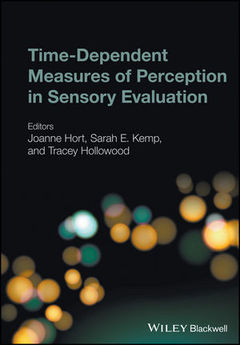Description
Time-Dependent Measures of Perception in Sensory Evaluation
Coordinators: Hort Joanne, Kemp Sarah E., Hollowood Tracey
Language: English
Subjects for Time-Dependent Measures of Perception in Sensory Evaluation:
456 p. · 16.8x24.6 cm · Hardback
Description
/li>Contents
/li>Biography
/li>
Sensory evaluation is a scientific discipline used to evoke, measure, analyse and interpret responses to products perceived through the senses of sight, smell, touch, taste and hearing. It is used to reveal insights into the way in which sensory properties drive consumer acceptance and behaviour, and to design products that best deliver what the consumer wants. It is also used at a more fundamental level to provide a wider understanding of the mechanisms involved in sensory perception and consumer behaviour.
Sensory perception of products alters considerably during the course of consumption/use. Special techniques are used in product development to measure these changes in order to optimise product delivery to consumers. Time-Dependent Measures of Perception in Sensory Evaluation explores the many facets of time-dependent perception including mastication and food breakdown, sensory-specific satiety and sensory memory. Both traditional and cutting-edge techniques and applications used to measure temporal changes in sensory perception over time are reviewed, and insights into the way in which sensory properties drive consumer acceptance and behaviour are provided.
This book will be a valuable resource for sensory professionals working in academia and industry, including sensory scientists, practitioners, trainers and students; and industry-based researchers in QA/QC, R&D and marketing.
Notes on Authors, ix
List of Contributors, xi
Preface, xiii
Preface to the Series, xvi
Acknowledgements, xix
Section 1: Introduction
1 Time-dependent Measures of Perception: An Introduction, 3
Joanne Hort, Tracey Hollowood and Sarah E. Kemp
Section 2: Physiological and psychological aspects of time-dependent sensory perception
2 Mastication, Salivation and their Interactions during Eating, 27
Guy Carpenter and Annie Blissett
3 Sensory-specific Satiation and Satiety, 48
Marion M. Hetherington, Samantha Caton and Chandani Nekitsing
4 Sensory Adaptation, 67
Louise Hewson and Amparo Tarrega
5 Sensory Memory, 88
Ep Köster and Jos Mojet
6 The Dynamics of Liking, 124
Jos Mojet and Ep Köster
Section 3: Techniques
7 General Considerations, 159
Erminio Monteleone and Caterina Dinnella
8 Time–Intensity Using Discrete Time Points, 182
Carla Kuesten
9 Continuous Time–Intensity, 237
Caroline Chaya
10 Dual-attribute Time–intensity, 267
Christopher J. Findlay
11 Temporal Dominance of Sensations, 283
Pascal Schlich and Nicolas Pineau
12 Multiple-ingestion Time–Intensity, 321
Linda Jamieson and Emma Watling
Section 4: Applications
13 Application of Time-dependent Measures to Food Products, 345
Nathalie Martin
14 Temporal Methods for the Assessment of Household and Personal Care Products, 362
Tracey Sanderson and Tracey Hollowood
15 Application of Time-Dependent Measures to Understand Sensory Perception, 388
Joanne Hort
Section 5: Summary
16 Summary, 401
Joanne Hort, Tracey Hollowood and Sarah E. Kemp
Index, 000
Joanne Hort, Associate Professor in Sensory Science, University of Nottingham, UK. Joanne Hort, BEd (Hons), PhD, MIFST, initially studied Food Technology and began her career in teaching. However, she returned to the university to receive her doctorate concerning the modelling of the sensory attributes of cheese from analytical and instrumental measures in 1998. As a lecturer at Sheffield Hallam University, she carried out sensory consultancy for local industry, developed a sensory program at undergraduate level and oversaw the installation of new sensory facilities before being appointed as Lecturer in Sensory Science at the University of Nottingham in 2002. She has since established the University of Nottingham Sensory Science Centre, which is renowned for both its sensory training and research into flavour perception. She delivers sensory courses at both undergraduate and postgraduate levels and is the Course Director for the Postgraduate Certificate in Sensory Science. Her research interests focus on the multimodal aspects of flavour perception and she has published several articles in this area, together with oral presentations and posters at international symposia. She is a founder member and current Chair of the Professional Food Sensory Group of the Institute of Food Science and Technology and was on the organising committee of the 6th International Pangborn Symposium in the United Kingdom in 2005.
Dr Sarah E. Kemp, Consultant and formerly Head of Global Sensory and Consumer Guidance, Cadbury Schweppes, Broadstairs, Kent, UK. Sarah Kemp, BSc (Hons), PhD, CSci, FIFST, is a sensory and consumer science professional with more than 20 years of experience in academia and industry. Dr Kemp gained a BSc in Food Technology in 1986 and a PhD in Taste Chemistry in 1989 from the Food Science and Technology Department at Reading University, UK. In 1990, she did a postdoctoral research fellowship on sensory analysis at the Monell Chemical Senses
These books may interest you

Olive Oil Sensory Science 180.05 €


